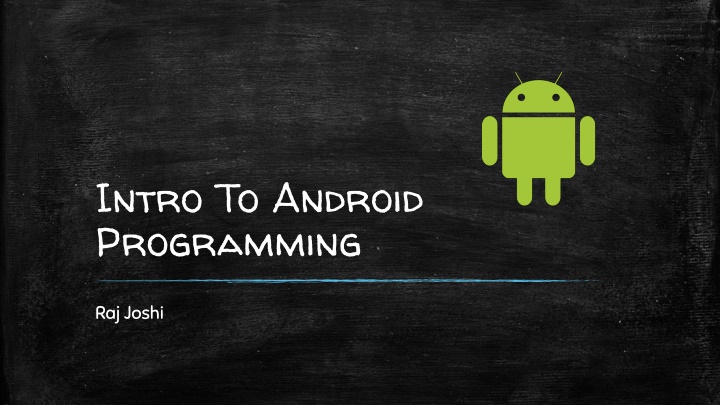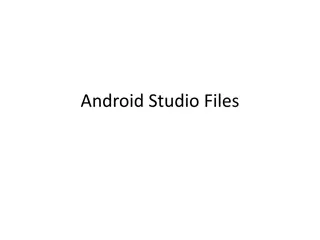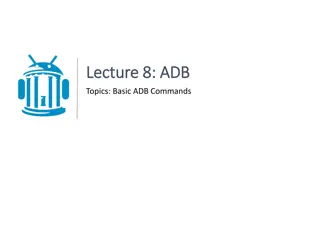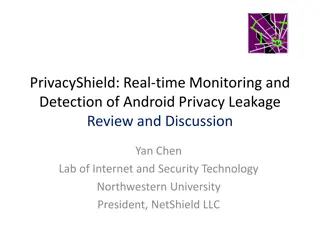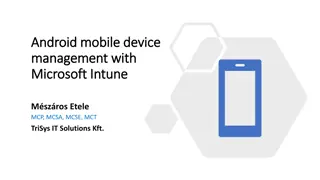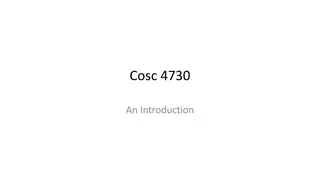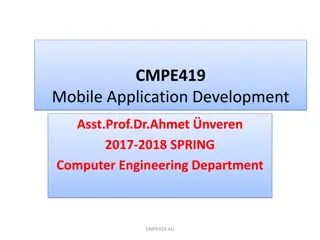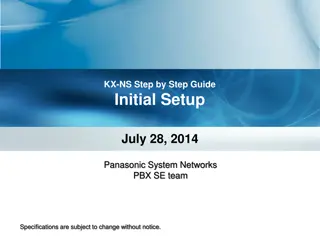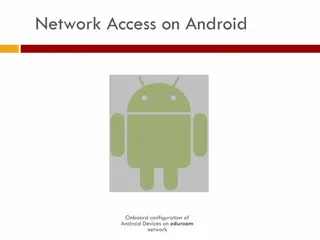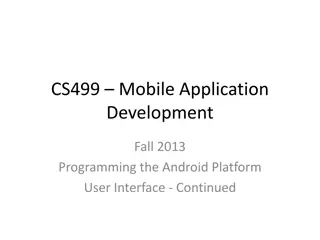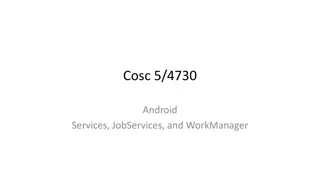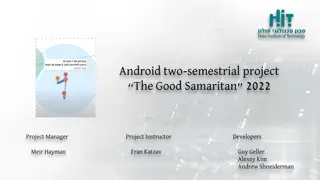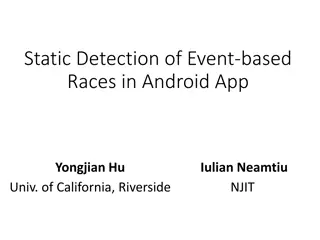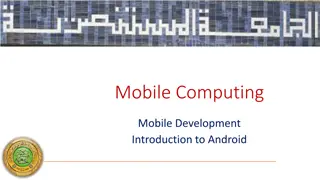Android Programming Overview and Setup
Learn about Android programming essentials, including Java basics, Android OS overview, environment setup with Android Studio, and getting started with Android development. Explore resources and tutorials to kickstart your journey into Android app development.
Download Presentation

Please find below an Image/Link to download the presentation.
The content on the website is provided AS IS for your information and personal use only. It may not be sold, licensed, or shared on other websites without obtaining consent from the author.If you encounter any issues during the download, it is possible that the publisher has removed the file from their server.
You are allowed to download the files provided on this website for personal or commercial use, subject to the condition that they are used lawfully. All files are the property of their respective owners.
The content on the website is provided AS IS for your information and personal use only. It may not be sold, licensed, or shared on other websites without obtaining consent from the author.
E N D
Presentation Transcript
Intro To Android Programming Raj Joshi
Getting Up To Speed With Java You can do it in one week (~2 hours a day): https://www.tutorialspoint.com/java/ http://www.learnjavaonline.org/ Head First Java (book) Learn just what is required: Basics: classes, methods, data types, loops & conditionals, file I/O, exceptions Parallelism: multi-threading, asynchronous function calls Do NOT waste time on advanced OOP concepts, design patterns, etc. Hate Java? Try Kotlin or both Java & Kotlin
Android OS Overview Operating System based on Linux Code compilation workflow: javac .class files dx classes.dex aapt .apk file .jar files resource files Android Runtime (ART): dex2oat Machine code (ELF shared object) classes.dex https://github.com/dogriffiths/HeadFirstAndroid/wiki/How-Android-Apps-are-Built-and-Run
Android Environment Setup What we need? - Java compiler and libraries Install Oracle Java 11 JDK (download link) - Android SDK (Android Java libs, dx, aapt, etc.) Install Android Studio (download link) - IDE and build system
Android Studio Official IDE for Android based on IntelliJ IDEA Uses Gradle a flexible build system Gradle build scripts automate the process of making apk Simplifies dependency management and thus life Bundles together all that is needed: Java IDE Android SDK Android Virtual Device emulator
Getting Started With Android Head First Android Development: http://shop.oreilly.com/product/0636920029045 .do Trial on Safari books OR buy Kindle version from Amazon (~ 50 SGD) NUS Library: just one copy Official Getting Started Tutorial Udacity Android Fundamentals - Google Stanford CS 193A http://www.vogella.com/tutorials/Android/ar ticle.html
Application Fundamentals Four Application Components Activities Services Content Providers Broadcast Receivers More details for interested readers: https://developer.android.com/guide/components/fundamental s.html Communication between components (except content providers): Intents
Intents Asynchronous message that binds individual components to each other at runtime. Think of it like: messengers that request an action from other components (even from other apps) Usage: Pass info from one activity (or app) to another. E.g. Camera app sharing photo via email. Pass info to a service
The manifest file Carries all the metadata about your app Important functions: MUST declare all components of the app Permissions that the app requires: Internet access, camera, sdcard, etc. java.lang.SecurityException: Permission denied (missing INTERNET permission?) Other functions: Minimum API level required by the app
User Interface and Events Activity: a single screen of UI in the app fundamental unit of GUI in Android View: visible on-screen items (XML code) Layout: invisible container to position/size the widgets Widgets: GUI control items like a button, drop-down menu, etc. Event: an action that occurs when user interacts with widgets Event Handlers (Java code) Adapted from Stanford CS 193A
Multi-threading Concerns in Android Main thread responsible for interacting with UI components Do NOT make a blocking I/O call from the main thread e.g. a blocking HTTP request leads to NetworkOnMainThreadException Use a different thread explicitly OR AsyncTask Do not access UI components outside UI thread Just a good practice to avoid race conditions
Debugging in Android android.util.Log API Log.v(), Log.d(), Log.i(), Log.w(), and Log.e() methods Output: logcat tab of Android Monitor within Android Studio
Important API References MediaRecorder MediaCodec Sometimes you need to get down and dirty! Useful third-party libraries: MP4Parser: for playing around MP4 container in Java OkHttp or Retrofit: for HTTP GET and POST Otto: event bus (publish-subscribe model)
Demo: Bigger Number Game (1) Adapted from Stanford CS 193A
Demo: Bigger Number Game (2) Suggestion: Watch the CS 193A 19wi Lecture 01: Introduction http://web.stanford.edu/class/cs193a/videos.shtml It explains how to build the Bigger Number Game. https://www.youtube.com/watch?v=iBBOUzGS8QU&feature=youtu.be Kotlin is now the default language, instead of Java. However, it is fairly similar.
